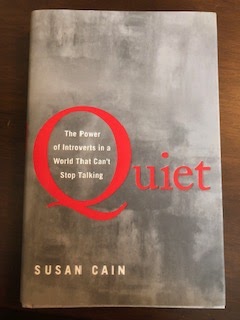What’s it like to be
an introvert in a culture that subscribes to the extrovert ideal? What do we
stand to lose by undervaluing and/or misunderstanding introverts? These are
just some of the themes Susan Cain explores in her 2012 ground-breaking book Quiet:
The Power of Introverts in a World That Can’t Stop Talking.
The concepts of introversion and extroversion are not new. Carl Jung popularized these (as the central building blocks of personality) over one hundred years ago. But Susan Cain’s book moves beyond psychological theory and classification to explore the implications of being an introvert in various social contexts, many of which seem structured in favour of the extrovert. She looks at the unique and often overlooked strengths of introverts and the advantages of recognizing these in a more deliberate way, particularly as one third to one half of the population are introverts.
The author admits there are almost as many definitions of introversion-extroversion as there are personality psychologists. However, there are several important points psychologists can usually agree on. Introverts and extroverts typically differ in the amount of stimulation they prefer, with introverts needing/seeking less stimulation. They also work differently. Introverts often work more slowly and deliberately, with high concentration, often preferring one task at a time. Extroverts tend to tackle assignments and decisions quickly, and are more comfortable with multi-tasking, risk-taking, and conflict. In the social realm, extroverts are often more dominant, assertive, and in need of company; they also think out loud and on their feet, preferring talking to listening. In contrast, introverts may have strong social skills, but have more finite energy for larger social events and small talk. They often prefer more intimate in-depth conversations, nurturing a smaller social circle, listening more than talking, and writing as opposed to talking.
Cain also does some myth-busting. Being an introvert is not the same as being a hermit or anti-social, nor are introverts necessarily shy. The author includes a 20-item assessment scale to give the reader a sense of where they might fall on the introversion-extroversion spectrum. Although, she notes, there is really no such thing as a pure introvert or extrovert and behaviour can also shift with circumstances. [Note: I include a few online scales below]
After introducing the basics, the author explores extroversion as a cultural ideal, and how this impacts assumptions around leadership, creativity, and workplace dynamics/structure. Although, there are select cultures where this is not the case. She also examines the nature versus nurture question regarding temperament, and provides some practical guidance for introverts re: navigating an extroversion-centric culture, parenting introverted children, and how to communicate in a mixed introverted-extroverted relationship. Woven throughout is considerable research and personal stories/case studies that help illustrate her ideas.
The late distinguished Hungarian-American psychologist Mihaly Csikszentmihaly offered an endorsement of this book, writing that introverts “will feel a burden lifting from their shoulders” as they read this book. And that is exactly how it felt for me. It was eye-opening and incredibly validating to see myself so accurately reflected in these pages; the experience was instrumental in helping me reframe my introversion in a more positive, strength-based light.
And I know I'm not alone in this experience. Whether introvert, extrovert, or somewhere in between, Quiet continues to provide us with a more accessible language to talk about our differences and how we can understand, celebrate, and leverage these attributes in multiple realms of work and play. In the ten years since this book was published the topic has gained further traction through such titles as The Introvert Advantage, social media groups like Introverts are Awesome, and workplace-focused training and development.
Are you an introvert or extrovert? Is this distinction meaningful to you and, if so, how?
Online Assessment Resources
- https://introvertdear.com/introvert-extrovert-test-quiz/
- https://testyourself.psychtests.com/testid/2094
